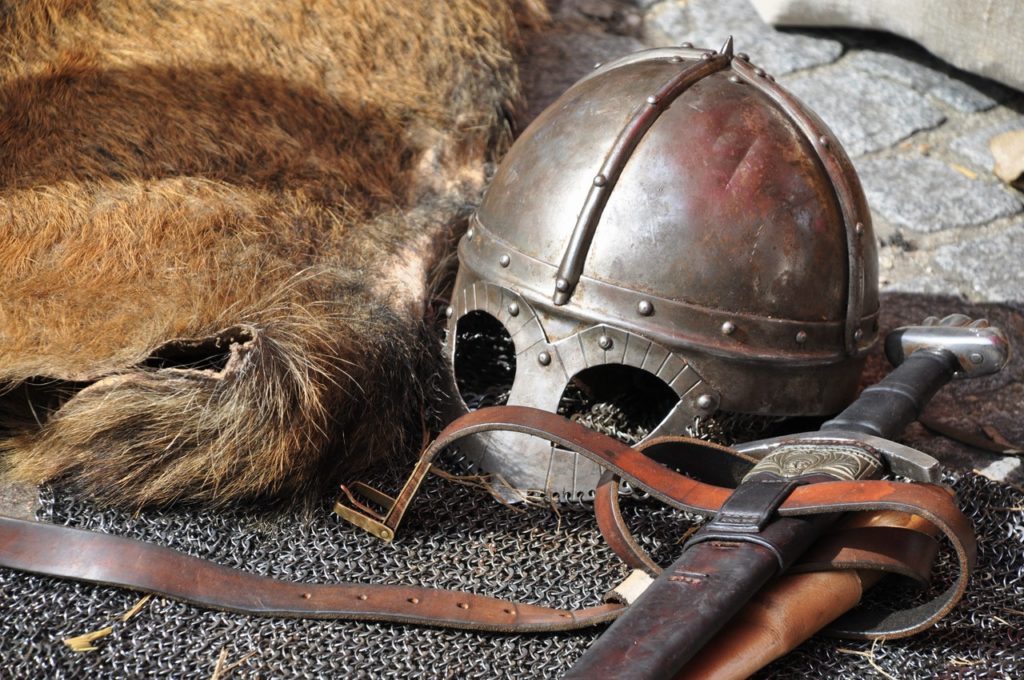
I learned this today. The Middle Ages and the Dark Ages both refer to Europe between the Fall of Rome in 476 AD and the beginning of the Renaissance in the 14th century. Some people say the “Medieval Period” is a better expression, but this means pretty much the same thing.
The idea that this period of time was different to what came before it and what came after it was raised by the Italian poet Francesco Petrarca. He wrote about it in the 1330s. He was a student of classical Greek and Latin works. He was of the opinion that the time he was living in and since the fall of the Roman Empire was dark. He was contrasting it with the “light” of classical antiquity. He thought that he was living in a time of ignorance. He also saw the dark as a lack of records, and the light as an abundance of records. He didn’t actually say “dark age”, though, just that it was dark. He used the word “tenebrae” which means darkness. In 1602, Caesar Baronius used the expression saeculum obscurum, to refer to the 10th and 11th centuries, but it stuck and became associated with the whole of the Middle Ages. The time was anything but dark, and we now have a very negative opinion of the time period because of it.
Building on this opinion that the time after the Fall of Rome was a dark period, Leonardo Bruni came up with the expression “Middle Ages”. He was a historian who lived in Tuscany, a region of Italy, between 1370 and 1444. He wrote a book called “The History of the Florentine People” that some people have called the world’s first history book. He was the first person to divide history up into three ages. Before him, history had been divided up into either four or six eras. These were both based on biblical readings of history and many people felt that the age they were living in was the last age before the end of the world.
Bruni looked around him and decided that the world was coming out of the Dark Ages. He thought that Italy was reviving and had entered a new age. He therefore decided to start the modern age from about where he was. He came up with three ages. The age of classical antiquity went from about 800 BC to 476 AD. The Middle Age was from 476 AD to the 14th century, just before he was writing. And the modern age was from where he was writing onwards. So, not really middle for us, but it kind of was for him. I think we can assume he didn’t know much about the stone age, bronze age, and iron age.
The expression “Middle Ages” comes from the Latin media tempestas, which means middle season. It was also sometimes written as medium aevum, which means middle age, and media saecula, which means middle centuries. The word “medieval” that we now use to refer to this period, actually comes from “medium aevum”. That means that people who use “medieval” because they don’t like “Middle Ages” are technically using the same expression with a different name.
We have come to see the “Dark Ages” as a time when there was no real advancement in culture, technology, or science, but this is obviously nonsense. The horse collar was adopted, which caused huge changes in society. Crop rotation was discovered. Agriculture went through an enormous evolution. The crane was invented. The wheelbarrow. The blast furnace appeared in Europe. Different kinds of mills were invented. The compass and glasses were invented. Mathematics took an incredible leap forward with work done in Arabia and India. The first universities were founded. A lot of military inventions were made.
So, the “Middle Ages” and the “Dark Ages” are expressions that were coined in the 14th and 15th centuries. The Italian poet Francesco Petrarca called the time he was living in a time of darkness because it didn’t compare to the light of the Greeks and the Romans. Then the Italian historian Leonardo Bruni divided the world up into three ages. He started the Middle Ages at the Fall of Rome and he believed that the world had entered a new age at the time he was writing, so he ended the Middle Ages there. The word “medieval” comes from the Latin “Medium aevum”, which means middle age. By looking at all of the inventions from the time, we can see that the Dark Ages were certainly not dark. And this is what I learned today.
Sources
https://en.wikipedia.org/wiki/Middle_Ages
https://en.wikipedia.org/wiki/Classical_antiquity
https://www.history.com/topics/middle-ages/middle-ages
https://www.historyextra.com/period/medieval/how-when-why-did-we-start-calling-medieval-era-name/
https://en.wikipedia.org/wiki/Leonardo_Bruni
https://www.britannica.com/biography/Leonardo-Bruni
https://en.wikipedia.org/wiki/Petrarch
https://en.wikipedia.org/wiki/Dark_Ages_(historiography)
